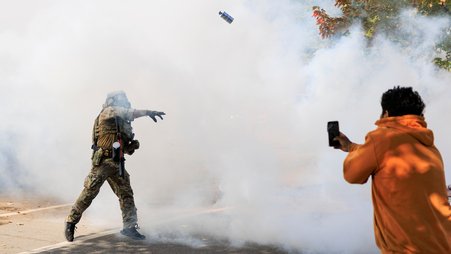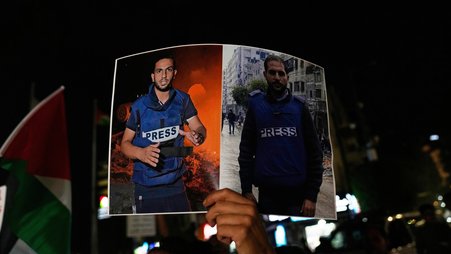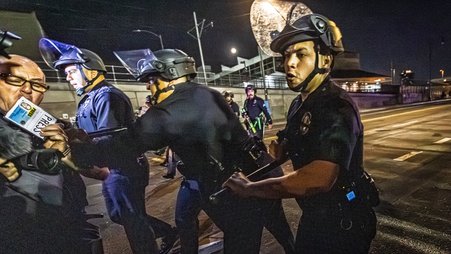“I am sorry, I have to leave (the conversation). Several of my colleagues are injured in Jabalia, and I have to cover the events.” That’s the direct message I received via X from Palestinian journalist Mohammed Mhawish during a live discussion hosted Oct. 9 by Freedom of the Press Foundation (FPF) about Israel’s multipronged war on press freedom.
For Palestinian journalists like Mhawish, it’s often impossible to sit down and contemplate the toll that the war has taken on them and their colleagues before even more devastating news hits, like the most recent Israeli attack on the Jabalia refugee camp and the journalists covering it.
The Israel-Gaza war is the deadliest for journalists in the past four decades or more. At least 123 journalists and media workers have been killed by Israel since the start of the conflict in October 2023. That makes up 70 percent of all journalists and media workers killed worldwide over the past year, according to the Committee to Protect Journalists.
Beyond the numbers, there are stories of unimaginable human suffering for the remaining journalists covering the war: devastation, displacement, permanent disability, and loss of loved ones, friends, and colleagues. And for those who were lucky enough to survive or flee, the psychological trauma lingers.
For Mhawish, a former Al Jazeera English correspondent in Gaza who covered the war from its start until late April and now lives in exile, it has meant “documenting the destruction of homes, the death of children all around me, bearing witness also to the loss of (an) entire generation of people,” he said during the X Space discussion.
Mhawish and his co-panelists discussed several prongs of Israel’s war on the press — and what the U.S. government should be doing in response.
Death threats and killings
Al Jazeera is the only major broadcaster that has been consistently reporting from Gaza since the start of the war. This, Mhawish explained, could be the reason why its reporters are targeted by Israel in an attempt to cut off the flow of information and control the war’s narrative.
“If a journalist in Gaza drops their camera or their pen, there would be nobody else to pick up the work that's left to be done,” Mhawish said.
At least eight Al Jazeera reporters or freelancers who work with the broadcaster have been killed since the start of the war and several have been injured, including two after being hit by Israeli fire while reporting earlier in October (one was left paralyzed and the other severely injured).
Mhawish said he himself had received multiple threats via calls and text messages from people who identified themselves as Israeli army officers. In one call, on Dec. 6, Mhawish was told his house would be bombed. The following day, the house, located in Gaza City, was indeed bombed.
That call was the last straw. Mhawish fled for his life.
The “press vest on the chests of Gaza journalists doesn’t provide any protection. To the contrary, it is a target,” Mhawish said.
There have been multiple reports of death threats being received by journalists and their families from Israeli officials because of their reporting. One of them targeted the 19-year-old Hassan Hamad, who was subsequently killed while reporting for Al Jazeera on recent Israeli attacks on the Jabalia refugee camp. Hamad’s remains had to be carried away in several boxes and bags. Human rights activists have posted screenshots of the threatening texts that preceded his killing.
‘Impunity acts like a virus’
When contacted about the Hamad and Mhawish threats, the Israeli army’s North American media desk responded to FPF’s request for comment by denying that it was responsible.
It also alleged that as many as six Palestinian journalists who work for Al Jazeera are “terrorists,” along with another unidentified number of members of the media it said without further evidence are “disguising themselves as journalists.” It made no such claims about either Mhawish or Hamad.
Israel has a history of fabricating claims of reporters’ ties to alleged terrorism, including claiming last year that it had found a list with Hamas members’ names, but it turned out to be only a calendar.
Paris-based Reporters Without Borders, meanwhile, said that there have been at least 32 cases where there is enough information to confirm the journalists were murdered by Israel while working.
The International Federation of Journalists estimates the mortality rate for media workers in Gaza to be over 10 percent, “dramatically higher than any other occupational group.”
"Indifference to journalists' killing because of their nationality or background is not just immoral, but irresponsible and dangerous,” Sherif Mansour, a Washington D.C.-based human rights and press freedom advocate, said during the FPF discussion. “Impunity acts like a virus; it knows no borders and, like violence, it knows no boundaries.”
Mansour is a co-author of a report from the CPJ, released a few months before the current war, which describes a 20-year pattern of Israel targeting Palestinian journalists with impunity, including the 2022 murder of Palestinian-American journalist Shireen Abu Akleh.
Several news outlets and research groups concluded Abu Akleh, a veteran Al Jazeera TV correspondent who was shot and killed by Israeli fire in the West Bank city of Jenin in May 2022, was targeted with the “intention to kill.”

Al Jazeera journalist Wael Dahdouh mourns his son Hamza, who also worked for Al Jazeera and who was killed in an Israeli airstrike in Rafah, Gaza Strip, on Jan. 7, 2024. Dahdouh lost his wife, two other children and a grandson earlier in the war and was nearly killed himself.
Barring international press
Israel’s targeting of journalists in Gaza is only one aspect of a multifaceted war on press freedom. Another is that virtually no international media is allowed to report from Gaza unless embedded with the Israeli army. An Israeli censor then decides what can be published.
The ban — enabled by the blockade of the Gaza Strip by both Israel and Egypt, two of the U.S.’s closest allies — is something “we've never seen in any war accepted by international media,” said Mansour. “It's a de facto ban that was enforced and accepted by international media, and it's a part of censorship that we saw echo all over the world.”
“Without journalists, the Israeli government … becomes the source of information, and that might well be the goal,” FPF’s Advocacy Director Seth Stern said during the discussion.
Israel's effective ban on foreign reporting has placed an impossible burden on Palestinian reporters in Gaza to document an ongoing war through which they are living. Even Israeli journalists can’t enter Gaza unaccompanied by their army, according to Israeli journalist Gideon Levy.
This week, FPF joined 18 press freedom and human rights organizations in supporting a call from members of the U.S. Congress asking the Biden-Harris administration to urge Israel to allow independent access to Gaza for international journalists.
Detentions of journalists
A third aspect of Israel’s aggression on the press is the detention of journalists in Israel and the West Bank.
According to a recent report from CPJ, Israeli authorities now hold the global record for arresting the most journalists per capita in a one-year period. Forty-three journalists remain detained by Israel, and many are held indefinitely without charge in violation of international law.
There are also numerous accounts of journalists held in Israel being subjected to torture, humiliation, and mistreatment.
Earlier in the month, U.S. journalist Jeremy Loffredo was detained by the Israeli army for four days following his arrest in the West Bank. He was reportedly charged with aiding and sharing information with the enemy, apparently because of his reporting on Iranian strikes. He was ordered to remain in the country until Oct. 20. Loffredo was finally able to leave Israel the next day, after the police dropped their investigation.
Bans, raids, and destruction of media landscape
A fourth aspect is the destruction of media institutions and bans on media. According to the Palestinian Journalists Syndicate, Israeli forces have destroyed at least 73 media facilities in the Gaza Strip and shut down 15 in the West Bank since the beginning of the war.
And in September, Al Jazeera televised live as heavily armed Israeli soldiers descended on its Ramallah bureau in an early morning raid and shut it down. The soldiers ordered everyone at the bureau to leave with “only their personal belongings.” Israel has no legal jurisdiction in the West Bank.
The raid came just a few months after the Israeli parliament passed a law to ban the broadcaster in Israel because it deemed Al Jazeera “a threat to security.”
Even the Israeli media wasn’t spared. Last year, less than two months into the war, Israel's communications minister threatened to take action against Haaretz by ending the publication of government notices in the Israeli newspaper for "sabotaging Israel in wartime" and being an "inflammatory mouthpiece for Israel’s enemies."
The U.S.’s (non)response
All of this comes in the context of a war that is being financed and fully supported by the United States. The U.S. has provided Israel with close to $18 billion in military assistance since the beginning of the war, although U.S. law prohibits it from arming countries that don't comply with international law. Deliberately targeting journalists is a war crime under international law.
In August, 140 press freedom organizations, journalists, and news outlets sent a letter to the U.S. Secretary of State Antony Blinken urging the U.S. to immediately cease sending weapons to Israel due to its continued killings of journalists.
In mid-October, the U.S. issued a rare warning to Israel threatening to withhold arms transfers unless the flow of humanitarian assistance to Gaza was not increased within a month — but there have been no similar warnings, let alone action, when it comes to targeting the press.
“The United States can't claim to not know anymore, and it can't claim to trust the Israeli authorities to investigate and change course,” Stern said.
Despite the U.S. administration’s alleged commitment to support free and independent media worldwide, “It has done exactly the opposite,” Stern said. “It supported the slaughter and censorship of free and independent media in Gaza and other affected areas.”
Stern concluded: “Governments that claim to operate the most moral army in the world are expected to take some reasonable measures to protect journalists, and particularly not target them.”
Mhawish, commenting on the attack on the Jabalia refugee camp in real time, said it’s “very enraging to me to see these targeted attacks against journalists and the world keeps just watching us die every day.”
Targeting journalists is “a way to silence the story and to silence those who seek to tell that story,” Mhawish added. Journalists in Gaza “carry cameras, (not) guns, but in the eyes of the Israeli military who seeks to hide the truth, we are a threat.”
“I see it as a genocide. (Journalists) are seen as a threat, we are seen as a danger,” Mhawish concluded. “I think silence is complicity.”
You can listen to the whole X Space conversation or read a transcript (imperfect, AI-generated), even if you don’t use X.





